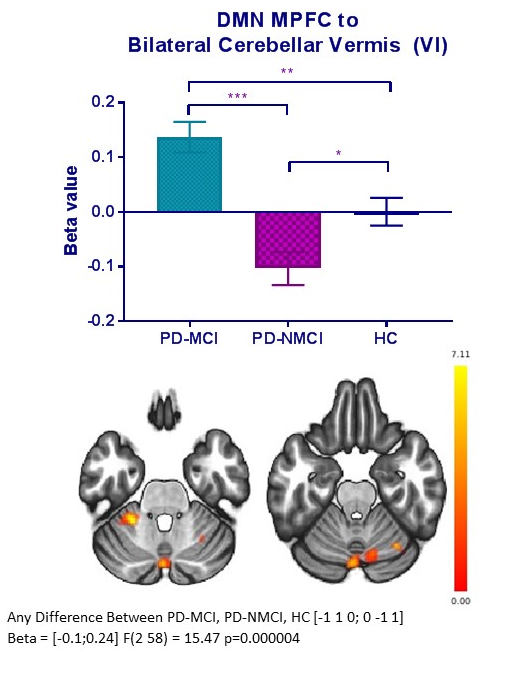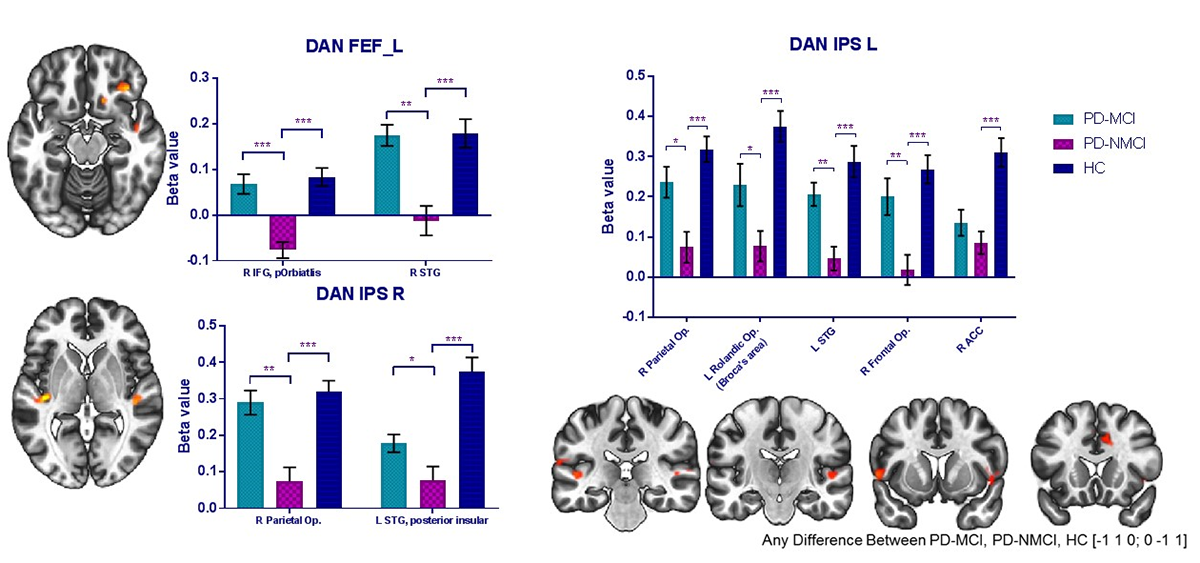Session Information
Date: Wednesday, September 25, 2019
Session Title: Neuroimaging
Session Time: 1:15pm-2:45pm
Location: Les Muses Terrace, Level 3
Objective: To investigate brain connectivity associated with Parkinson’s disease patient with mild cognitive impairment during resting-state fMRI
Background: Cognitive disturbances in Parkinson’s disease (PD) is one of the factors that detrimentally impacts the patient’s quality of life and contributes to a high disease burden. A quarter of PD patients experience cognitive disturbances when diagnosed with PD and ultimately develop dementia (Hely, Reid et al. 2008). Mild cognitive impairment (MCI) is common in PD and is a prodromal state of dementia. This study aimed to investigate brain connectivity associated with PD-MCI during resting-state fMRI. This may extend understanding of the neurobiology of pre-clinical dementia in PD.
Method: 14 PD-MCI, 25 PD-NC (normal cognition) and 22 age and gender-matched healthy controls (HC) were scanned (3T Siemens PRISMA). PD-MCI was diagnosed using a comprehensive cognitive battery according to the recommended diagnostic criteria (Litvan, Goldman et al. 2012). Seed-based functional connectivity analysis was performed to identify altered connectivity between seeds in the default mode networks (DMN), frontoparietal network (FPN), and dorsal attention network (DAN) to other regions between groups.
Results: PD-MCI and PD-NC showed no significant difference in PD related measures such as PD duration, UPDRS-III, HY stage, and LEDD. MPFC in DMN to bilateral cerebellar vermis (VI) showed a significant increase in connectivity in PD-MCI compared to PD-NC and HC, with PD-NC having a significant decrease in connectivity compared to both PD-MCI and HC. Compared to PD-NC, PD-MCI showed up-regulated functional connectivity between Left FPF and bilateral IPS seeds in DAN and IFG, STG and parietal regions. However, there was no difference between PD-MCI and HC.
Conclusion: Increased functional connectivity between MPFC and bilateral cerebellar vermis in PD-MCI emphasise the important role of the cerebellum in cognition. The previous study also reported the possibility of the compensatory prefrontal cortical-cerebellar loop in PD-MCI (Zhan, Lin et al. 2018). Furthermore, increased functional connectivity in PD-MCI between DAN and other regions could be a compensatory effect. Despite prominent cognitive deficit in PD-MCI, PD-MCI is still not in a state of dementia. Longitudinal studies will provide in-depth knowledge of altered functional connectivity in cognitively impaired PD.
References: Hely, M. A., W. G. J. Reid, M. A. Adena, G. M. Halliday and J. G. L. Morris (2008). ‘The Sydney multicenter study of Parkinson’s disease: The inevitability of dementia at 20 years.’ Movement Disorders 23(6): 837-844. Litvan, I., J. G. Goldman, A. I. Tröster, B. A. Schmand, D. Weintraub, R. C. Petersen, B. Mollenhauer, C. H. Adler, K. Marder, C. H. Williams‐Gray, D. Aarsland, J. Kulisevsky, M. C. Rodriguez‐Oroz, D. J. Burn, R. A. Barker and M. Emre (2012). ‘Diagnostic criteria for mild cognitive impairment in Parkinson’s disease: Movement Disorder Society Task Force guidelines.’ Movement Disorders 27(3): 349-356. Zhan, Z. W., L. Z. Lin, E. H. Yu, J. W. Xin, L. Lin, H. L. Lin, Q. Y. Ye, X. C. Chen and X. D. Pan (2018). ‘Abnormal resting‐state functional connectivity in posterior cingulate cortex of Parkinson’s disease with mild cognitive impairment and dementia.’ CNS Neuroscience & Therapeutics 24(10): 897-905.
To cite this abstract in AMA style:
J. Yang, K. Mcmahon, D. Copland, G. Byrne, J. O'Sullivan, N. Dissanayaka. Identifying altered resting state network connectivity in Parkinson’s disease with mild cognitive impairment [abstract]. Mov Disord. 2019; 34 (suppl 2). https://www.mdsabstracts.org/abstract/identifying-altered-resting-state-network-connectivity-in-parkinsons-disease-with-mild-cognitive-impairment/. Accessed April 3, 2025.« Back to 2019 International Congress
MDS Abstracts - https://www.mdsabstracts.org/abstract/identifying-altered-resting-state-network-connectivity-in-parkinsons-disease-with-mild-cognitive-impairment/


